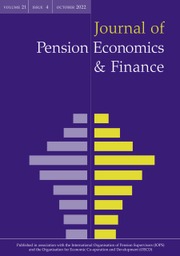Article contents
What is an adequate standard of living during Retirement?*
Published online by Cambridge University Press: 14 November 2011
Abstract
Many economists and policy-makers argue that households do not save enough to maintain an adequate standard of living during retirement. However, there is no consensus on the answer to the underlying question about what this standard should be, despite the fact that it is crucial for the design of saving incentives and pension systems. We address this question with a randomized survey design, individually tailored to each respondent's financial situation, and conducted both in the U.S. and The Netherlands. We find that adequate levels of retirement spending exceed 80% of working life spending for a majority of respondents. Minimum acceptable income replacement rates range from 95 to 45% across income quintiles in the U.S., and from 75 to 60% across income quintiles in The Netherlands. The smaller range in The Netherlands may in part reflect the much tighter income distribution there.
Keywords
- Type
- Articles
- Information
- Copyright
- Copyright © Cambridge University Press 2011
Footnotes
We are grateful to the editor and anonymous referees for very helpful suggestions. We are also grateful to Yvonne Adema, Rotraut Binswanger, Jan Boone, Axel Börsch-Supan, Katie Carman, Norma Coe, Jeffrey Dominitz, Josef Falkinger, Ernst Fehr, Alia Gizatulina, Sally Gschwend, Michael Halliasos, Eline van der Heijden, Hendrik Jürges, Arie Kapteyn, Miles Kimball, Markus Knell, Annamaria Lusardi, Olivia Mitchell, Hans-Theo Normann, Charles Noussair, Jan Potters, Maarten van Rooij, Claudia Sahm, Matthew Shapiro, Jonathan Skinner, Arthur van Soest, Karen van der Wiel, Joachim Winter, and to participants at the MESS workshop, at Netspar workshops, at the conference on ‘Economic and Psychological Aspects of Household Saving Behavior’ in Deidesheim, and seminar participants at Tilburg University, the University of Mannheim, and the University of Muenster for many helpful comments. Daniel Schunk thanks the Center for Economic Studies (University of Munich), where part of this work was done, for its generous hospitality and the helpful comments from colleagues. Special thanks go to Vera Toepoel from CentERdata and to Bas Weerman from RAND for programming our questionnaire. Financial support from CentER and Netspar is gratefully acknowledged.
References
- 45
- Cited by


